


by Larry Fink and Judith Joy Ross Allentown Art




by Larry Fink and Judith Joy Ross Allentown Art
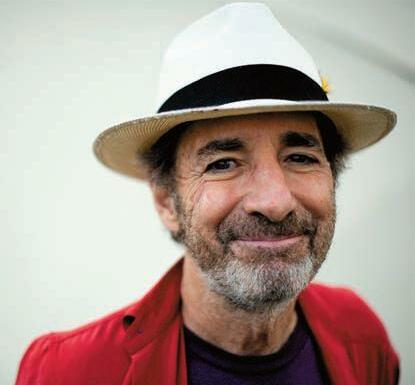
From his debut in Abbott and Costello Go to Mars to writing and acting
This is Spinal Tap, being the voice of Mr. Banks on The Simpsons, and becoming Donald Trump’s
The intersection of art, entertainment, culture, nightlife and mad genius.
Since 1992
215-862-9558 icondv.com
PUBLISHER & EDITOR
Trina McKenna trina@icondv.com
ADVERTISING
Raina Filipiak filipiakr@comcast.net
PRODUCTION
Paul Rosen
Joanne Smythe
Margaret M. O’Connor
CONTRIBUTING WRITERS A.D. Amorosi
Ricardo Barros
Robert Beck
Pete Croatto
Geoff Gehman
Susan Van Dongen Grigsby
Fredricka Maister
David Stoller
Keith Uhlich PO Box 120 New Hope 18938 215-862-9558
IReproduction in whole or in part without written permission is strictly prohibited. ICON welcomes letters to the editor, editorial ideas and submissions, but assumes no responsibility for the return of unsolicited material. ICON is not responsible for claims made by advertisers. ©2022 Primetime Publishing Co., Inc.
IT WAS A LITTLE before 9:00 when I arrived at Fischer Bros. & Leslie, the butcher and deli on 72nd near West end. I had walked up Broadway trailing my kit behind me on a small hand truck against a frigid breeze and was happy to be inside. One of the employees was cleaning the front window, inside and out, and they were still moving a delivery into the back. I parked my kit in front of the cold case and spent a few minutes deciding what spot would give me an interesting composition without being the way.
One of the precepts for painting on-site is that you must get permission from the boss. A boss is defined as someone who can make a de-
CONTINUED ON PAGE 24
STORY & PAINTING BY ROBERT BECK
Timestamp:
Photographs by Larry Fink and Judith Joy Ross


Allentown Art Museum
31 N. Fifth St., Allentown, PA
610-432-4333 AllentownArtMuseum.org
Through April 16, 2023

Timestamp brings together the work of two of the most important photographers of the twentieth century, renowned for creating probing and engrossing studies of people and everyday life. This exhibition presents a selection of images by Larry Fink from the 1960s and early 1970s, and by Judith Joy Ross from the late 1980s and early 1990s.
James A. DePietro Solo Show

Nazareth Center for the Arts
30 Belvidere St., Nazareth, PA Nazaretharts.org
February 18-March 26, 2023
Artist Reception Sunday, February 19, 2-4
Open weekends and by appointment
A mini-retrospective of the artistic vision of James A. DePietro which encompasses works from his last three series: The Shadow Series (2014 - 2017), Objet d’Art Series (2017 - 2020), and The Stream of Consciousness Series (2020 - present).

Emil Lukas: Four Modes
Lafayette College Art Galleries
Grossman Gallery
243 North Third St., Easton, PA Galleries.lafayette.edu
January 23-April 15, 2023
Artist Talk / Reception: February 2, Buck Hall

219 N. Third St., Easton, PA
Emil Lukas is the Grossman Visiting Artist at Lafayette College for Spring 2023. Lukas’ residency will include an exhibition, an artist talk, and a printmaking project at the Experimental Printmaking Institute. This exhibition is curated by Robert Mattison and features four types of work Emil Lukas has been exploring and creating for decades: Puddle paintings, Larvae paintings, Thread paintings, and Bubble paintings define an artistic practice that continuously expands the vocabulary of contemporary art-making.

We watched the horizon Claim the sun, Trying to remember How it felt to be young.
I closed my eyes — And I was thirteen. \Would anything ever Feel the same as that seemed?
Now, the seaside Has ceased its play, The glistening blue Turned to grey, And we, who were boys once Leave slowly, away. Self-portrait

Scene at Holly Beach was painted in 1895 by Thomas Pollock Anshutz, an American artist noted for his portraiture and scene paintings. Anshutz was also noted for his teaching and leadership at the Pennsylvania Academy of Art, where he was considered one of the most influential teachers of his generation. In 1892 he retired (having replaced Thomas Eakins in 1886 as head of drawing and painting) and bought a summer residence in Holly beach at the Jersey shore. There, he focused on watercolors, producing what many consider his best work, including the painting featured here. In a letter to his brother in 1893, he said, “I feel very anxious to make a living outside of teaching and see no better scheme than to go to Holly beach, New Jersey, and turn out a lot of watercolor pictures of the seashore.”
I love how he captured the luminous quality of the light at the shore — and the natural innocence of the young boys, which gave rise to my poem, We Were Boys Once and Young. Ironically, Anshutz is portraying these two boys naked, the very thing that got his teacher, Thomas Eakins, expelled from the Academy in a scandal sparked by his use of a fully naked male model in front of his female painting class. He was charged with “conduct unworthy of a gentleman and discreditable to this organization." In addition to not defending his mentor, he signed the letter of expulsion — and was promptly promoted to Eakins’ position. n
David Stoller has had a career spanning law, private equity, and entrepreneurial leadership. He was a partner and co-head of Milbank Tweed and led various companies in law, insurance, live entertainment, and the visual arts. David is an active art collector and founder of River Arts Press, which published a collection of his poetry, Finding My Feet



It took me decades to understand the magic of photography. At first I thought the magic sourced from the medium, so I studied light, lens, and wet darkroom craft. Then it dawned on me that the photographers I admired photographed certain things. Without meaning to, I searched for those things as if they were touchstones on the path to enlightenment. Eventually, I stumbled across my blind spot. I had been thinking of photographers apart from their subjects. Great photographers were keen observers, this I could see in their work, yet I had pictured them at a remove. I had thought an interesting life just happened to parade in front of their cameras.
Now I know that parade is no accident. These photographers were not fortunate bystanders - they chose to be involved. Events we see in their photographs would not have happened absent the photographers’ presence. The photographers were partisans, collaborators, facilitators, chal-
lengers, antagonists, lovers, and muses to their subjects. Moreover, the photographers had agency. They made things happen. Photography is a bridge connecting photographers to the people and things they photograph. Magic sources not from medium, but from what transpires because of the photographer’s engagement.
Artist Caroline Gibson needed publicity pictures to promote an upcoming show, so she stopped by one evening for me to photograph her work. Somewhat casually, we created a studio in my living room. As we began to photograph, an unexpected momentum built. She continuously brought out new pieces, and I kept pace by unpacking more equipment. Soon, we had cluttered all of our space with both art and camera gear. I shot more film than I intended, and in ways she didn’t need. My compositions began to include more of Linny. Only later did we realize that we had made a portrait. n

Metropolitan Opera performances are extremely enjoyable on huge movie screens, live and not in person. They’re especially enjoyable at Miller Symphony Hall in Allentown, where for four decades Met stars sang with the resident orchestra. I thoroughly enjoyed December’s Miller/Met HD telecast of The Hours, an often thrilling new piece pivoting around three women in three decades piecing together painful puzzles. I didn’t have to travel to Manhattan to pay half a month’s rent
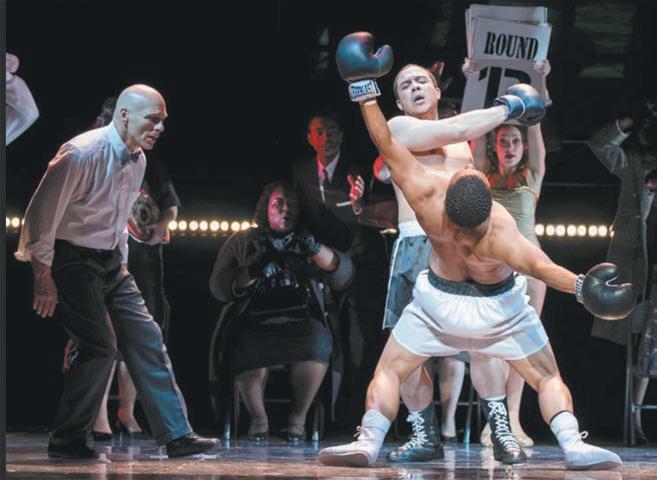
So much of February is geared around Valentine's Day affairs and whatever Presidents’ Week has become that it is highly possible not to want to venture out this month; or, at the very least, do something that doesn’t involve love, chocolate, or government. And isn’t that a pity? The chocolate, I mean.
I’m actually going to contradict myself about this first event — the Philly Chocolate, Wine & Whiskey Festival on Saturday, February 18, at the Philly Expo Center in Oaks, PA –—and why? The whiskey, man. The whiskey. However, I wouldn’t suggest drinking too much, lest you find yourself the next day, February 19, at Citizens Bank Park Philadelphia Wedding Expo Indoor Event in glorious South Philly. If only the 2023 Sneaker Con at the Pennsylvania Convention Center came later than February 11 — all the better to run from the situation to begin with.
Philadelphia Motown’s (or Motown Philadelphia)’s finest, Boyz II Men, do double duty this month — performing as part of the 25th An-

to enjoy Joyce DiDonato, Renee Fleming, and Kelli O’Hara, a holy trinity of singing actors. Roaming cameras put me in the thick of brilliant blockings (a character ages 30 years within a beehive of chorus members) and exquisite dynamics (Virginia Woolf struggles to compose herself while composing a novel). Sure, I missed the grand excitement of a Lincoln Center crowd. But those folks missed the grander feeling of sharing the stage of a grand event. (Seven Met productions will be broadcast this season at Miller, 23 N. 6th St., Allentown; 610-4326715; millersymphonyhall.org. Circle June 11 for a new Die Zauber-
CONTINUED ON PAGE 28
Geoff Gehman is a former arts writer for The Morning Call in Allentown and the author of five books, including Planet Mom: Keeping an Aging Parent from Aging, The Kingdom of the Kid: Growing Up in the LongLost Hamptons, and Fast Women and Slow Horses: The (mis)Adventures of a Bar, Betting and Barbecue Man (with William Mayberry) He lives in Bethlehem. geoffgehman@verizon.net
niversary event at the Hard Rock Café on February 8 in Center City and as headliners at The Met on February 11. Not enough great stuff has been said about Philly’s most commercially successful and soulfully harmonic trio. So, I’m saying it.
CONTINUED ON PAGE 24
A.D. Amorosi is a Los Angeles Press Club National Art and Entertainment Journalism award-winning journalist and national public radio host and producer (WPPM.org’s Theater in the Round) married to a garden-to-table cooking instructor + award-winning gardener, Reese, and father to dogdaughter Tia.



Saint Omer (Dir. Alice Diop). Starring: Guslagie Malanga, Kayije Kagame, Valérie Dréville. Marguerite Duras gets namedropped early in writer-director Alice Diop’s first dramatic feature, and what follows bears many of the alienating yet still headily stimulating effects of that inimitable artist’s work. A French literature professor named Rama (Kayjie Kagame) travels to the subprefecture of Saint-Omer to attend the trial of Laurence Coly (Guslagie Malanga), a Senegalese woman who is accused of leaving her deceased toddler to drown on the seashore. The trial occurs in what often feels like real time, with procedural rigmarole and the opaque glances of Coly and the white female judge

(Valérie Dréville) providing most of the (anti)drama. There is pleasure and profundity to be had reveling in the enigmas of such mundanely everyday interactions. Though Rama’s own parallel struggles — her motherly and womanly fears coming to the fore the longer the case goes on — too often feel like a contrived counterbalance to the more compelling spectacle of the court case itself. The very dryness of the proceedings allowing for a slow, simmering emotional devastation to bubble over by film’s end. Getting there is a bit more taxing than one would like, however.
[N/R] HHH
The Kingdom: Exodus (Dir. Lars von Trier).
Keith Uhlich is a NY-based writer published at Slant Magazine, The Hollywood Reporter, Time Out New York, and ICON. He is a member of the New York Film Critics Circle. His personal website is (All (Parentheses)), accessible at keithuhlich.substack.com.
Starring: Mikael Persbrandt, Bodil Jørgensen, Udo Kier. It took 25 years, but writer-director Lars von Trier finally returns to the haunted Denmark hospital that was the setting for his two season television series The Kingdom, which ran for a total of eight episodes in 1994 and 1997. This five-part conclusion — something von Trier has hinted will be his last project given his recent Parkinson’s diagnosis — ties up almost all the loose ends. Though narrative is less the point than an overall puckish pessimism that should be familiar to anyone versed in von Trier’s provocationprone oeuvre. Since much of the main cast of the original series has passed away, a pair of new main characters, sleepwalking psychic Karen (Bodil Jørgensen) and beleaguered
CONTINUED ON PAGE 27
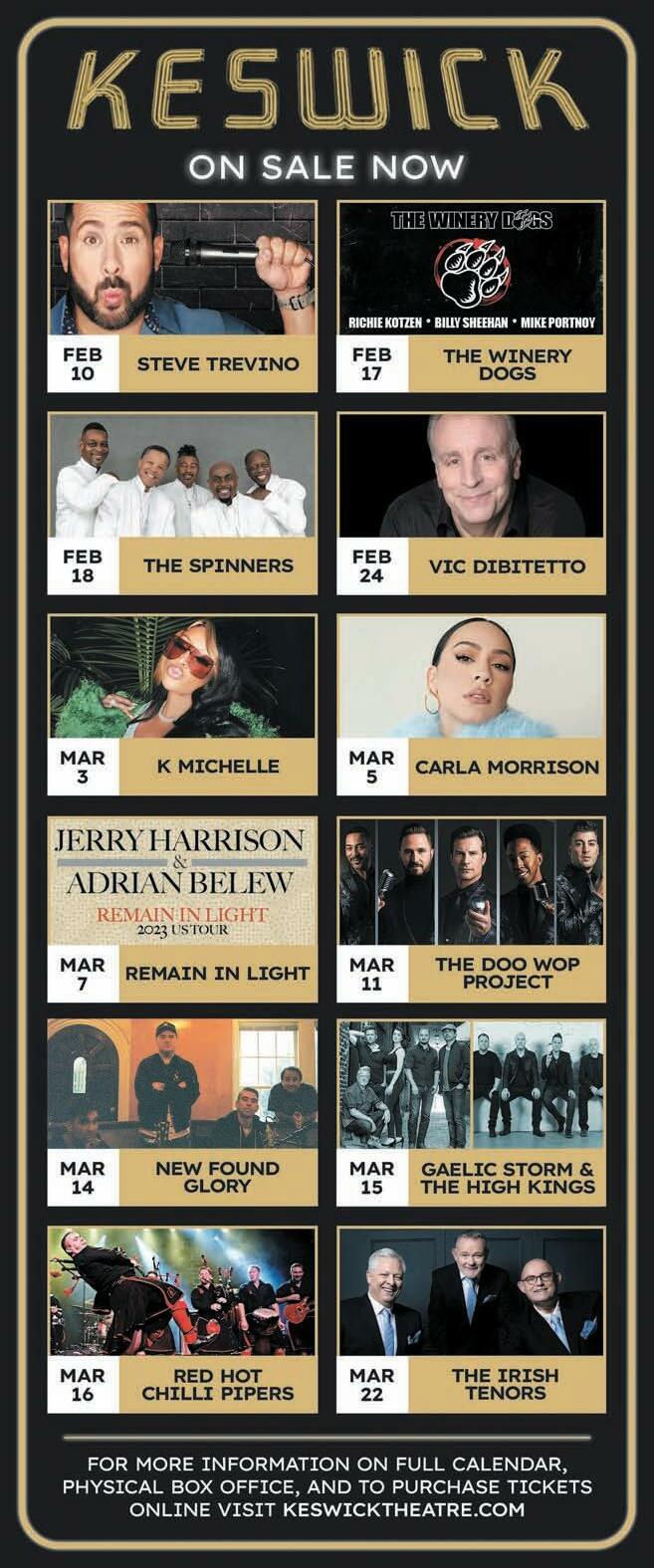


A MAN OF MANY talents with many outlets — Simpsons characters voice artist, a member of the rockumentary metal act Spinal Tap, an actor, a novelist-essayist, a film screenwriter, and director — Harry Shearer’s longest-running, continuous throughline has been that of Le Show. Here, as a small, intelligent mobile unit and autonomous, socio-cultural commentator and content creator, Shearer is front and center of the syndicated public radio comedy sketch and satirical news program. Dropping new, multi-layered, and elaborately recorded episodes every Sunday, Le Show has been ongoing and fresh since December of 1983, with Shearer acting as a one-man-band behind an arsenal of voices on both sides of the political fence as well as its press mediators.
When you created Le Show in 1983, the radio landscape was different than your morning show in Los Angeles in the 1960s, The Credibility Gap — and certainly different from where you are now.
It’s necessary to put that phrase in a larger context. Commercial radio changed radically — that’s an understatement — when Bill Clinton signed the deregulation policy where the number of stations that an individual corporation could own in the country was seven, to a situation like that of iHeart Radio owning 800 stations. Commercial radio was no great shakes, anyway. But, what that did, in the mid90s, was make radio stations into a bunch of repeaters. A radio guy would
sit in Kansas City, and after his shift there, he’d turn around and say, “Good morning, San Diego.”
There was little localization after Clinton and only a few singularly hand-crafted radio programs
The idea of radio being anything but a mindless conveyor belt for more and more commercials became foolish. The Credibility Gap was on commercial radio when it started, so I had familiarity with that world. But that was in the 1960s — whatever else you can say about that decade, people who would ordinarily be safe and conservative, at least in that world, were willing to try something new if things weren’t looking perfect and profitable. That’s how The Credibility Gap got on the air in the first place — at the number two rock and roll radio station in town that could never figure out how to beat the number one station. At some point, management at the station, who happened to be connected to The Smothers Brothers Show on TV, were willing to try something new. Our time there was, as it turned out, a battle against people who thought that you get to be the number one station by imitating everything that the top station did. Imitation is the sincerest form of radio, to misstate an old Fred Allen line. They shortened our time slots but couldn’t fire us because they would have to pay us unemployment. So they just took our show off the air but told us that we would have to read the news straight. We did that but it was probably the
CONTINUED ON PAGE 18
From his debut in Abbott and Costello Go to Mars to writing and acting in This is Spinal Tap, being the voice of Mr. Banks on The Simpsons, and becoming Donald Trump’s alter ego, the list goes exhaustingly on and on.

CONTINUED FROM PAGE 16
worst news broadcast in America for a week or two. Well, that ended them firing us, so we succeeded. Then we went to another commercial radio station at the dawn of underground FM. We went from an argument that said you can’t have a radio program longer than a hit record to taking our time — 23 minutes or three minutes, depending on how imaginative we were feeling that day.
What’s different about Le Shownow compared to its start?
There’s a very clear line of demarcation. I’d been doing stuff a satirist always does, make fun of the news. Aside from that, I played a lot more music and did a sketch or two. Then, after 911 with the internet, I was able to keep up with news in the U.K., Australia, and beyond. I knew that what President Bush was saying publicly — what they were calling intelligence — was bullshit.
But nobody in this country, not The New York Times or NPR, had that on their pages or airwaves. So I decided that knowing as much of the truth as I did and that such truth was authoritative — and that I had a microphone — that maybe I should put the two together. So, the news content of Le Show grew after that and increased dramatically. I couldn’t be contemptuous of The New York Times and NPR and not do something about it.
Considering what happened to you previously — what was the driving force in Le Show’s creation? What interested you about the radio format?
I had been doing my own Sunday afternoon show, not with sketches about the news, as that was The Credibility Gap’s field. But I had the occasional sketch and played a lot of records because music was so vibrant then. A friend from that station got a job at KCRW in Santa Monica and had intimated that I do a show there.
You could move around radio more easily then.
Radio, compared to other mass media, was something you could do with ease. It was easy to do on your own. Doing your own show on television required a crew of a hundred people or so. Film, too. Having done my own show for decades now with radio, I only need one other person to make sure it gets on air and me to do the show, write it, and produce it. Given the fact that people weren’t handing me television shows, radio was an attractive alternative.
You got your start on early television with Jack Benny. Did you perform on serial radio as a kid?
Yes, I broke in on Jack Benny’s radio show. I did radio soaps for ABC, one for a few months called When a Girl Marries. I did the Phil Harris radio show. On Sundays — and this is something that I loved about the old Los Angeles — NBC Radio had this big building at Sunset and Vine, and CBS Radio was on Sunset and Gower. I did The Jack Benny Show at 4:00 p.m. and walked down Sunset Boulevard to do The Phil Harris-Alice Faye Radio Show at 6:00. That was pretty cool.
You’ve worked for BBC. Were they more cooperative than your U.S. counterparts?

That’s fraught for me. I can say this: I’m not yet persona non grata at BBC the way I am at NPR. I did a documentary for Radio 4 in 2015 on the tenth anniversary of the flooding of New Orleans — all public knowledge here, despite the major networks and NPR having split within a week after the flood and patting themselves for having spoken truth to power. I made it, and they aired it, but they pretty much quashed all promotional mentions of it on the network in advance. I was really displeased by that. There are people at BBC who do a great job, and I also think that BBC is under so much more constant political attack than NPR has ever dreamed of that you have to cut the BBC a certain amount of slack.
You said that on radio you could report the news through satire more fully. You joked on the December 11 episode of Le Show as Chris Wallace, casually stating how at his new place of employ, CNN, there is no staff and no more fact-checkers or runners as their finances and ratings have fallen. I know your research is painstaking, but how do you handle the news beyond you?
I read a lot of newspapers —– The Washington Post, The New York Times, The Guardian, and The Age in Australia. Haaretz in Israel. Trade publications such as Advertising Age. The San Diego news desk contributes a good amount of material, along with other volunteers. Huge kudos to them, an amazing volunteer.

Le Show is also a podcast. To what do you attribute the rise and scattered success of many podcast-only platforms?
Their success proves that you can kill radio, but the audio medium is still great and powerful. The radio industry has done its darndest to make it all unlistenable, and the idea that within a decade of the deregulation we talked about, podcasting came along to show this is what it should sound like. That’s no surprise. My problem with podcasting is that the advertisers who buy time on podcasts are reverting to the 1930s format of commercial radio, and demand that the talent read the commercials. I picked up a recording of NPR’s Ira Glass speaking
to a convention of podcasters in 2018, and he said, “Public radio is open for business.” Great. Great. Adam Carolla is the only podcaster who has an announcer in the booth so that he doesn’t have to read ads. You can’t logically go from a hard news, serious political interview to, “I want to ask you more about the Ukrainian army, but, you know, my wife and I have been sleeping on the best mattress for the last three months.” I’m gone after that. Absolutely out of there. They think they’re opening for business. I think they’re shredding their credibility.
The late great Paul Harvey and the late great Joe Franklin were two of the best at segueing from hard news to conversation. They were two very different people with two very different approaches. If I were involved in a conversation with them, I’d feel like a third wheel. They don’t need me because they’re amusing each other. I love that on radio — what I am on Le Show is one person talking to an audience. That’s why I do it. n
If you miss a live Le Show, you can catch it at Shearer’s radio/podcast archives: harryshearer.com/le-show.

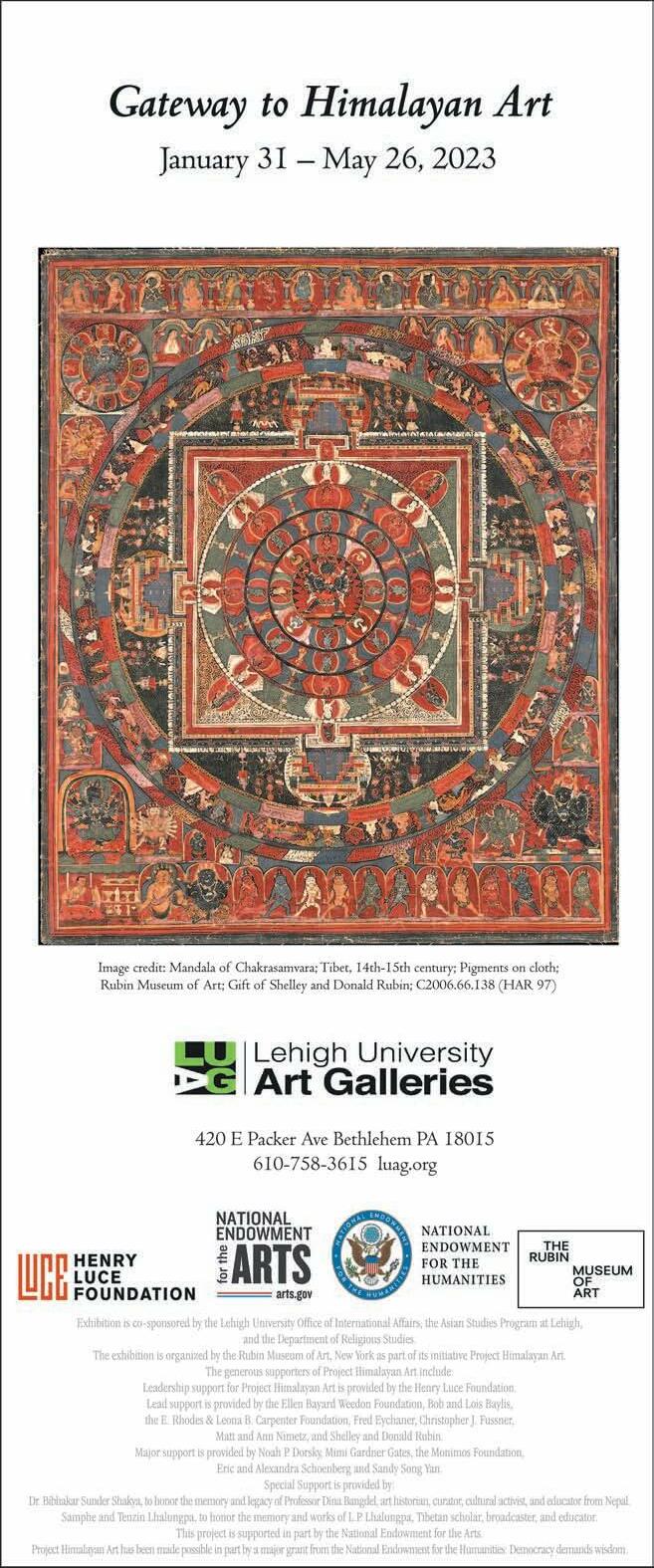
The Night of the Hunter (1955, Charles Laughton, United States)
KEITH UHLICHFor his only directorial effort, actor Charles Laughton chose to adapt a fanciful horror of a novel by Davis Grubb about a bestial preacher/serial killer who terrorizes a West Virginian family. Robert Mitchum brilliantly plays the evil reverend, Harry Powell, who insinuates himself into the lives of the Harper family (Shelley Winters plays the mother, Billy Chapin and Sally Jane Bruce the two children), at first to secure an illicit payout courtesy the jailed patriarch Ben (Peter Graves). But it’s clear Powell most gets off on the power he wields over people (a potent early image is a closeup of his switchblade piercing through his pants pocket — the sexual charge of the moment is unmistakable). The children eventually go on the run and are taken in by the kindly and protective Rachel (Lillian Gish), who treats Powell like the demon-in-flesh he truly is. Laughton approaches the story like an adult fairy tale with shadow-laden deep focus photography by Stanley Cortez and a poetic screenplay by James Agee heightening the aura of unearthliness. And yet somehow the disturbing feelings the film evokes, particularly about the nature of good and evil, are all-too-recognizably human.
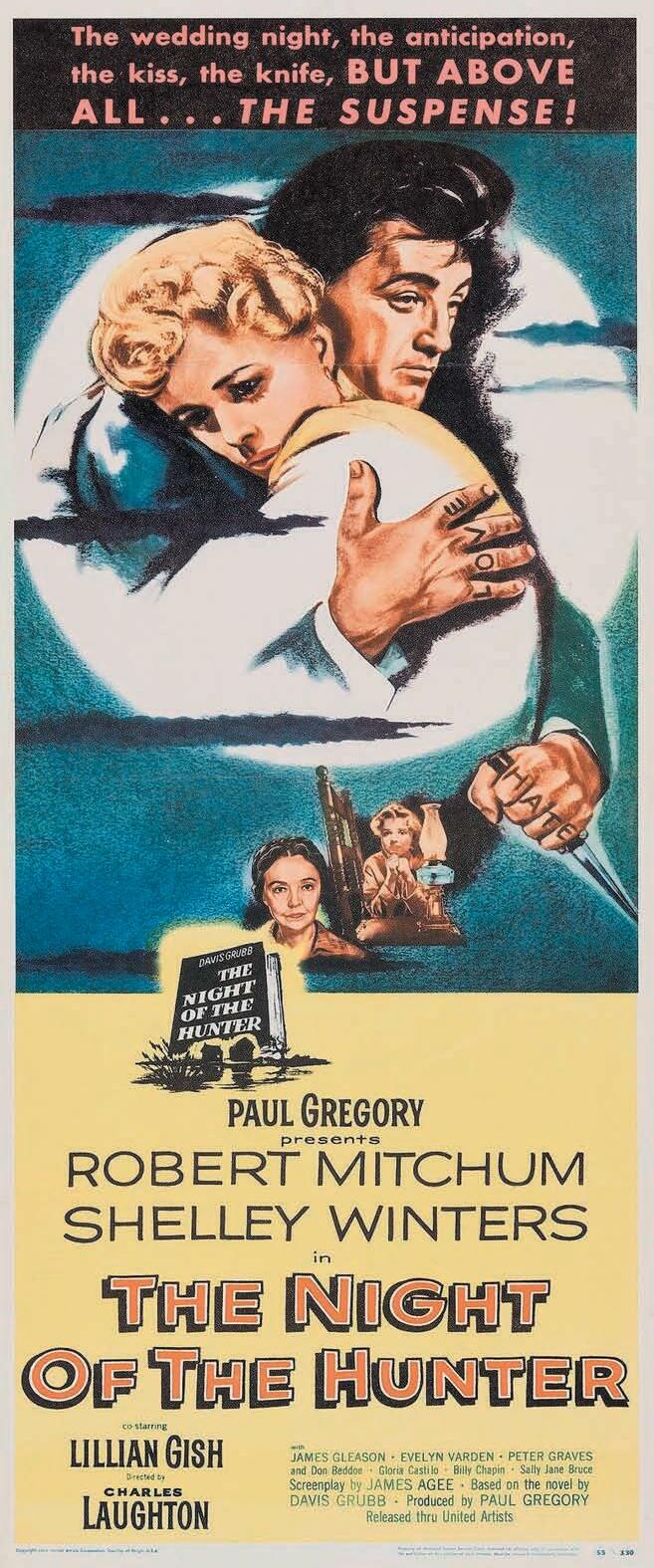
(Streaming on AppleTV.)
Ali: Fear Eats the Soul (1974, Rainer Werner Fassbinder, W. Germany)
A standout in the already towering filmography of German writer-director Rainer Werner Fassbinder, Ali: Fear Eats the Soul reworks Douglas Sirk’s great melodrama All That Heaven Allows into a much more grittily thematic, if still lushly visual romance. Emmi (Brigitte Mira) is a 60-something German widow and window cleaner who happens into a friendship, and then a love affair, with Moroccan guest worker Ali (El Hedi ben Salem). Their relationship exposes the micro and macro racial fault lines in post-war Germany, as both family members and complete strangers let their hatred get the better of them. Fassbinder’s blend of the soberly quotidian (the down-in-the-muck ambience of political, economic, and spiritual poverty that envelops all the characters) with the luxuriantly theatrical (see, for example, the dreamlike lighting in the bar in which Ali and Emmi first meet) is beyond compare and especially astonishing given that he shot the film in just under two weeks as an exercise in-between larger productions. (Streaming on Criterion Channel.)
Beau Travail (1999, Claire Denis, France)
One of the ten greatest films of all time according to Sight and Sound’s recent once-a-decade poll, Claire Denis’ loose adaptation of Herman Melville’s novella Billy Budd will reorient your sense of what cinema can be. The slender narrative is concerned with the repressed longings
CONTINUED ON PAGE 22
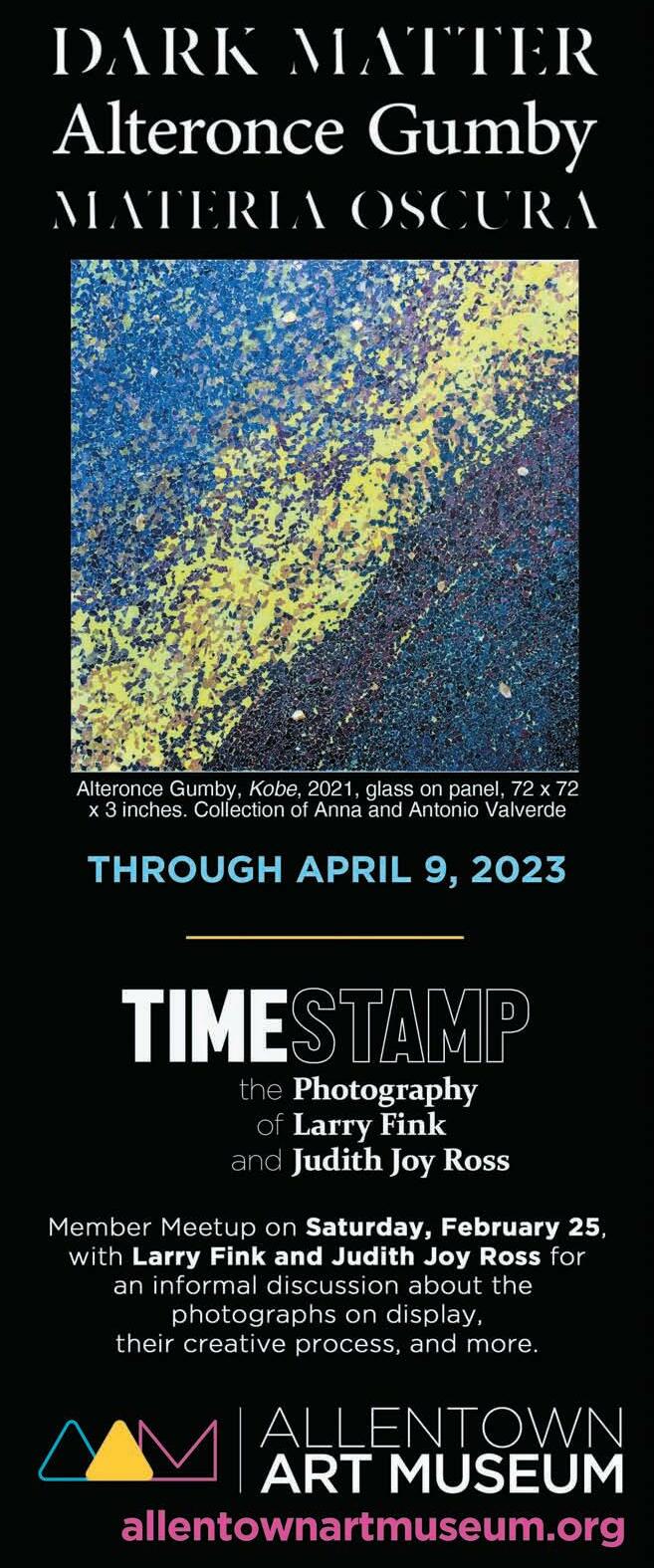


FILM CLASSICS CONTINUED FROM PAGE 20


of a French Foreign Legion soldier, Galoup (Denis Lavant), for his arrestingly beautiful comrade, Gilles (Grégoire Colin). That slim outline allows Denis and her frequent cinematographer Agnès Godard to take a visually and aurally suggestive approach as Galoup’s obsession leads him down multiple paths of destruction. There are balletic scenes of the soldiers doing training exercises in the heat of the African republic Djibouti, and the exotic locale itself is part and parcel with Denis’ career-long fascination with the colonialist impulses of her French homeland. (And might the subjugation of a country also relate in some way to the subjugation of the self?) The film also features one of the greatest final scenes in cinema, as the stifled Galoup cuts loose to the Italian Eurodance group Corona’s “Rhythm of the Night.”
(Streaming on Criterion.)
Shoah
(1985, Claude Lanzmann, France)

Claude Lanzmann’s epochal Holocaust documentary is often marketed as a nine-and-ahalf-hour film when it is actually two features (“First Era” and “Second Er”a) of four-plus hours each that complement the other. Eschewing re-enactments, Shoah engages with the horrors of the past entirely through the present — via discursive interviews with survivors of the concentration camps and the Warsaw ghetto, as well as haunting (and
haunted) imagery of the land where the camps stood. Lanzmann stokes both the imagination and the intellect, most powerfully in “First Era’s” climactic sequence, which provocatively links a modern-day conglomerate to the business-as-usual Nazi war machine. The film also uses repetitions (imagery of trains pulling into and out of stations; interviewees parroting back interviewer questions) to show how fluid the truth can be under the pressure of day-to-day life. To remember this terrible period of history is to grapple with it enduringly and endlessly. (Streaming on Amazon.) n




CITY / CONTINUED FROM PAGE 12
Any occasion to celebrate a new casino is always a worthwhile enterprise because, you know, I love to gamble. Which is why — huzzah — having Parx Casino Shippensburg drop anchor on February 3, (you know, pending PGCB testing and approval). I don’t care how far away Cumberland County is — its 500 slot machines and 48 electronic table positions, and a first-class 100-seat restaurant. Bet. With that, I should add that, closer to Philly and its suburbs at Parx Casino Bensalem, their Xcite Center’s live schedule for February is highlighted by the Feb 24 appearance of the rudest comedian that Australia has ever bred — and that’s saying something -— Jim Jefferies. Expect cocaine jokes, drinking jokes, misogynistic jokes, and cocaine jokes. He likes cocaine jokes. Who doesn’t?
Not touching on the cocaine — not the humor, and not the powder — is homeboy comedian Todd Glass who returns to his Philadelphia stomping grounds at Helium Comedy Club February 23 through 26. Unpredictably obtuse and abstract, Glass is always a breath of fresh air

cision that won’t get countermanded. Most times, everybody else along the chain doesn’t want to be responsible for this artist guy who wants to paint here for some unfathomable reason. When I went the first time to ask to paint (it’s important to do it in person), the guy I was directed to wasn’t the boss, but he was in charge. People in that position are rarely receptive. He didn’t take to the idea (his body language said,”this could only be trouble.”) and he told me to call back later and talk to Paul. The guys behind the meat counter were watching. They had the same body language. They also had knives. And blood on their aprons.
When I got through to Paul Whitman, he couldn’t have been nicer. I told him what I wanted to do, and he was all for it. When I showed up on that cold morning he just waved from behind the counter. That was all I needed. I was in with the boss.
Fischer’s is a step back into another era—not to a Disney caricature of the neighborhood butcher, but to a time of long-term relationships. Fischer’s offers a product rather than dazzle you with marketing, which I find refreshing. It doesn’t cover every square inch of wall space with incentives and provocations. The store feels spare but unmistakably genuine — a location scout’s dream.
as his comedy stylings are never punchline-punchline-punchline but more of a feel-good slap and tickle.
Let me stick with the nice vibing for a minute because humanity and goodwill is not a thing in which I normally traffic. The Kimmel Cultural Campus’ Academy of Music is hosting the 21st Century Broadway musical Come From Away from February 7 to February 12, and the excursion is life-affirming. Dealing as it does with the real-life interactions of a Newfoundland community welcoming 38 U.S.-based planes forced to land in Canada after the horror on Nine-Eleven, the story is soaked in loving humanity and tenacity. That’s better than Valentine’s Day, right?
Back to cynicism, few authors — musical or otherwise – can wrap snark in a blanket of character-driven narrative as has Elvis Costello in his now 45+ year career. On the verge of releasing a box set of his work with Burt Bachrach, Elvis Costello & The Imposters is performing at the Wind Creek Event Center in Bethlehem, PA. No. I have never been there, but I suggest this is the time to go.
And back to cocaine, on February 10, the decadent liege of hair metal, Mötley Crüe, with Def Leppard hit up the Hard Rock Live at Etess Arena at Hard Rock Hotel & Casino Atlantic City in Jersey. No stripper pole is safe. n
awoman stood at the meat case and asked questions of a patient butcher while trays of chicken and red meat were being loaded onto the racks. People would come in and ask when a certain dish or preparation would be ready. Plates of food were shuttled to the window as they emerged from the kitchen. A man with a guitar on his back stopped to get chicken nuggets and soup to take with him for lunch. Occasionally I would have to move my easel (a maneuver perfected over thirty years in the field) while someone looked for soup in the case. Everybody needed two pulls to get in. The doors opened with a suction noise and pulled themselves closed, resisting the intrusion.
The sounds and aromas reminded me of the Amish butcher shop of my Pennsylvania youth. Every so often, the door to the meat locker at the other end of the room would open with a metallic cuh-jank of the hand lever, and close with a solid chunk, briefly volunteering glimpses of large hunks of meat.
This is not a place with a public restroom, but the cold weather and my morning coffee got the best of me, and I had to ask. I was sent through the back room with the directive that if I ended up outside, I went too far. It was a scene reminiscent of a Hollywood set, with equipment of the trade and people at their business everywhere I looked. A guy peeling potatoes into a large pot, roasted chickens being carried past on a spit. If you’ve ever worked in a kitchen, you know the pace and the choreography.
Paul Whitman never stopped moving. Behind the counter or on the phone, he was a blur. Paul went out the front door and came back three or four times while I painted, each time with a hesitation at my easel to tell me I was doing a nice job. He is a gentleman, kind to everyone no matter their tone.
When I was done, a big guy came over from behind the meat case, red smears across his waist, knife in his left hand. He fished a phone out of his pocket, smiled and said,”can I take a picture?” I said of course. n






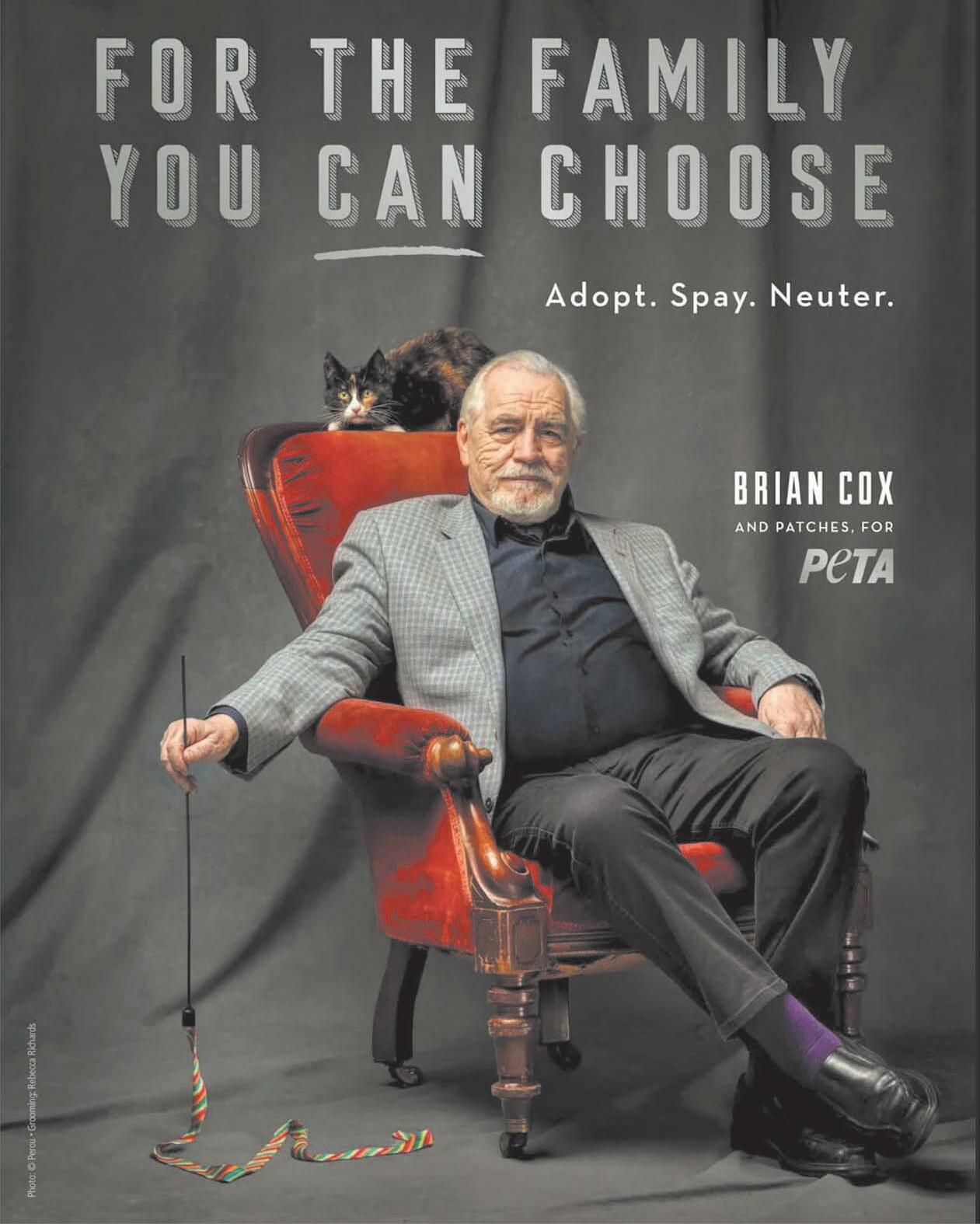
Swedish medical man Helmer Jr. (Mikael Persbrandt), take precedence. Though in a clever twist, they’re more than aware of their status as replacements. That’s just one of many meta touches woven throughout (another is that the first two seasons of the series exist in the world of the third and are a prime irritation to several of the hospital staff). Like von Trier’s great Nymphomaniac, Exodus is a brilliantly told extended joke, creepy and funny in equal measure, and building to a literally demonic punchline that is as cackle-inducing a career-capper as one could hope for.
[N/R] HHHH
Avatar: The Way of Water (Dir. James Cameron). Starring: Zoe Saldana, Sam Worthington, Kate Winslet. Back we go to the planet Pandora, where blue giants named Na’vi reign and “Sky People” (us colonizing Earthlings) mostly do them dirty. Writer-director James Cameron’s long-gestating sequel to his 2009 sci-fi epic picks up the tale of former Marine-turned-Na’vi Jake Sully (Sam Worthington), his warrior wife Neytiri (Zoe Saldana) and their now sprawling interspecies family — most notably teenage Kiri, motioncaptured by Sigourney Weaver — as they go on the run from the first film’s resurrected villain Miles Quaritch (Stephen Lang). The narrative and its attendant dialogue are, par for the course for Cameron, often risibly simplistic. Yet this perversely allows the computergenerated sights and sounds (mastered for 3D and High Frame Rate technology) to shine. Sully and his family hide out among a seashore tribe for much of the three-plus-

hour running time so the visions are primarily water-related. And Cameron seems as much in his element bombastically redoing the sink-the-ship climax of Titanic (this time with indigo aliens!) as he does allowing his digitally-augmented cast to swim at length with a whale-like species that talks telepathically…with subtitles! The artistic hubris is astounding, and the movie often jaw-droppingly justifies the ego trip. [PG-13] HHH1/2
The Eternal Daughter (Dir. Joanna Hogg). Starring: Tilda Swinton, Carly-Sophia Davies, Zinnia Davies-Cooke. A coda of sorts to her two-part semi-autobiographical features The Souvenir and The Souvenir Part II, writer-director Joanna Hogg’s latest uses ghost story trappings to examine and excavate the stormy relationship between a mother and daughter. The most inspired decision is the casting of Tilda Swinton as both the elderly Rosalind and the middle-aged Julie, the latter of whom Swinton’s own child, Honor, played in The Souvenir diptych. Julie — a filmmaker searching for inspiration for her next project — takes her mother to a remote hotel that the older woman once frequented in her youth, a place where strange occurrences (eerie sounds in the night; ghostly figures peering from windows) are a given. The creep factor works its magic for a while, as does Swinton’s general excellence in both roles. Yet the reveal of what’s actually going on is pretty evident from frame one, and rarely possessed of the metaphoric and emotional resonance that would make this anything more than a selfabsorbed curio. [PG-13] HH n

VALLEY / CONTINUED FROM PAGE 12
flote and April 29 for the new Champion, jazz trumpeter Terence Blanchard’s exploration of haunted boxer Emile Griffith)

Movies move us through familiar and unfamiliar worlds. Watching non-mainstream movies is more otherworldly in the 19th Street Theatre, an Art Deco plaster palace opened and closed to “photoplays” in 1928. The show begins with the glittering marquee and glowing façade with butterflies and elephants. Inside the ornate auditorium, recently restored to bejeweled glory, I’ve relished the basketball doc-
Six days a week, I drive 19 urban, suburban, and country miles to Brig O’Doon, the best-damned coffee-and-conversation house in Bucks County and beyond. Every day but Monday, when the Brig is closed, I clean the cobwebs with a savory dark roast, a hearty pumpernickel bagel, and a healthy chat with, say, a singles-bar bartender in swinging ’60s Manhattan or a Playboy Club bunny in swinging ’60s London. Easing into the morning is easy in an inviting space with 6-by-7-foot windows that lighten the darkest moods; life is just as breezy on a slateand-stone patio graced by rose bushes and pots of backyard-grown

umentary Hoop Dreams and the Shakespearean dramedy In the Bleak Midwinter. Across the street, at the smaller, starker Theatre514, I’ve communed with the visionary, wacky directors Pedro Almovodar (Julieta) and Martin McDonagh (The Banshees of Inisherin). Seeing nearly 200 films over 33 years on 19th Street makes me a tribal investor. (514 and 527 N. 19th St., Allentown; 610-433-8903; civictheatre.com)
Old books demand sensing: touching, smelling, scouring. Quadrant Book Mart & Coffee House, the Valley’s oldest literary emporium, is a sensory paradise. Its 50,000-plus used volumes exude a comforting aroma of dusty paper, cloth, and leather. Arrangements are pleasantly haphazard, matching the mismatched windows on the antique brick exterior. Modern first editions share a room with “Disasters”; a Charles Lindbergh memoir shares a table with a pigeon encyclopedia. The sense of a wildly eclectic, eccentric library intensifies in a sitting alcove within three sides of shelves. This personal collecting vibe continues in a book-lined, buzzing café specializing in hearty, zesty fare: Tex-Mex omelet, grilled spinach/wild rice wrap, and chocolate-and-raspberry latte. (20 N. 3rd St., near Center Square, Easton; 610-252-1188)
flowers. The menu brims with tasty, twisty treats: spicy avocado toast; aioli steak melt; sweet-potato chili; cold-pressed organic beet juice infused with lemon, ginger, and carrot. A tag team of young staffers are remarkably quick, polite, cheerful, and neat; they guarantee that the Brig is remarkably clean. These good citizens are mentored to mentor each other by owner Patrick Mullaney, who runs the former general store as a hospitality center and free-range forum. Voraciously curious, he has the methodical mindfulness of Socrates and Columbo; I dig our pin-balling debates about baseball and the Bible. Our friendship began 13 years ago when my late mother and I stopped at the Brig during our weekend country cruises. Patrick always gave Mom two pieces of multi-grain bed to take home, a gift of kindness that made the Brig my best retreat. (239 Durham Rd., east of Route 611, Ottsville; 610-8476844; brigodooncoffeehouse.com)
Covered bridges are time tunnels. Those timber-trussed chambers zoom passengers to the days before highways and wristwatch GPS when cows and horse(less) carriages sputtered through passageways built to imitate calming barns. The Valley’s seven-time tunnels are part of a very pleasant 50-mile tour from suburban Allentown to rural Kreidersville. All seven are painted barn red, five cross the same creek, and two anchor a park with a zoo. Wehr’s has the most picturesque setting, a grassy bank with picnic tables. Bogert’s is the longest and busiest, close to a fish hatchery and a Native American museum. The jazziest interior belongs to Manasses Guth, named for a pioneer settler. Those slanted, crisscrossing supports resemble wooden whale bones. (discoverlehighvalley.org) n


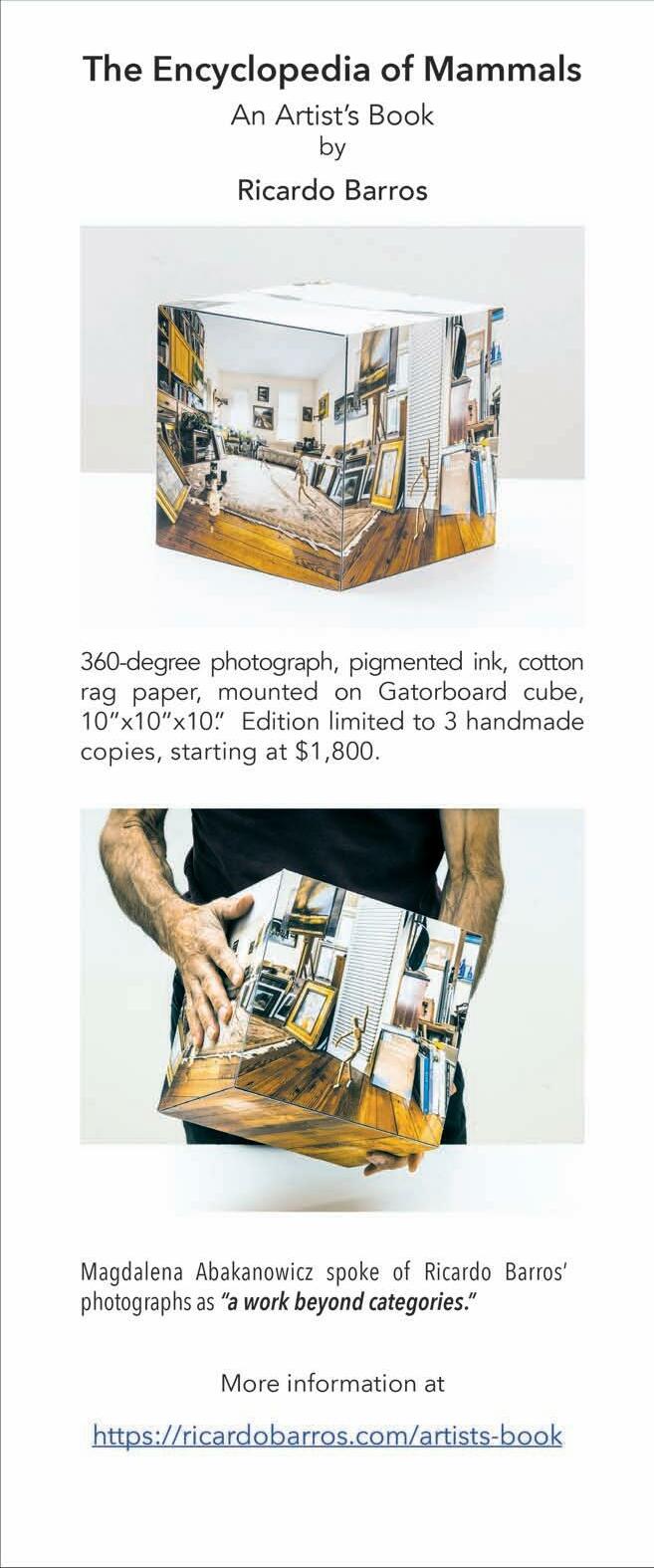
Atmospheric warming is shrinking the diurnal temperature range, the septic systems of Nags Head are failing as sea levels rise, and PFAS are damaging the immune systems of Cape Fear alligators. Reduced flow from the Colorado River is causing the Salton Sea to dry into toxic dust. Microbes on Mars may have degraded the planet’s atmosphere by overproducing greenhouse gases. The Late Miocene Cooling Event, previously attributed to carbon dioxide drawdown from Himalayan silicate weathering, may have been caused in large part by ash from Andean volcanism. Smallscale tests are under way to model the installation of a 169-mile-wide seaweed farm in the South Atlantic Gyre, and scientists were hopeful that metal-organic frameworks will allow targeted carbon dioxide removal from the atmosphere and may aid human colonization of other planets. 3D printed bricks of lunar regolith were deemed potentially viable for construction on the moon. Precession was observed for the first time among a pair of binary black holes. Tree ring records indicate that a Miyake Event has about a 1 percent chance of occurring in the next decade, though it is unclear whether it would destroy human civilization. Climate change may make it difficult for Shias to commemorate the martyrdom of Ali but will increase opportunities for seeing rainbows.
9
The Journal of Moral Education found that adults prefer children’s diplomatic lies to their blunt honesty. A survey of eighteen countries found that children who play around rivers, lakes, and seas have better mental health as adults. Newborns who have suffered left-hemisphere strokes shift sentence processing to the right hemisphere. Previously deployed U.S. service members retain the dust of the Afghan and Iraqi deserts. Targeted memory reactivation with the C69 piano chord reduces the incidence of non-traumatic nightmares and increases the joyousness of dreams. Three hundred and eight years after they were first observed, phantom violin notes were proven to be real, and can be produced more powerfully by superior violins. Injecting healthy genes into the eyes of adults with a form of congenital blindness restored their night vision. A team from the Institute of Transformative Bio-Molecules discovered the pheromone that makes grass puffer fish spawn on beaches under the moonlight. Hypoactive sexual desire in women may be mitigated by kisspeptin. Researchers cautioned that the “apparently more liberated sexual behavior” reported by redheaded women “could be the consequence of potential mates’ frequent attempts to have sex with them.” Erect-crested penguins reject their first eggs. Migratory birds lured by light pollution are then poisoned by air pollution.
9
Britons, among whom non-padded coats have the longest consumer lifespan of any garment, are dying faster than expected. A switch to year-round daylight saving time would result in 36,550 fewer U.S. deer deaths each year. Colorado scientists who x-rayed eleven swarms of bees discovered complex and beneficial clustering patterns, and a Massachusetts woman was arrested for wielding a swarm of bees to attack police officers on Memery Lane. Eastern fence lizards may improve their resistance to fire ant stings by eating fire ants. The horns of all five species of rhino have been getting smaller over the past century. When an aye-aye picks its nose, its finger travels through the sinus, into the throat, and into the mouth. “It was like—where is it going?” said the researcher of the behavior. “Is it inserting it into its brain?” Mice do not vomit, but they do retch. Blue fibers found amid the dental calculus of sacrificial victims in a Belizean cave may have been Mayan death gags. n
Portion of Japanese Americans who support the Democratic Party: 2/3
Of Vietnamese Americans who do: 1/3
Portion of Catholic Latinos in the Northeast who support the Democratic Party: 9/10
Of Protestant Latinos in the South who do: 1/2
Percentage of Democrats who say we should support Ukraine in the war against Russia for “as long as it takes”: 68
Of Republicans who do: 50
Minimum number of fake Twitter accounts operated by the U.S. military that have been suspended since 2012: 170
Percentage of those accounts that had fewer than one thousand followers: 81
Chances that a registered voter thinks mainstream media is a “major threat” to democracy: 3 in 5
That a Trump voter does: 9 in 10
Portion of working parents who say their pay has not kept pace with inflation: 7/10
Of working adults who say they have moved to an area with a lower cost of living to cut expenses: 1/5
Portion of Europeans who are cutting back on essentials like food and heat to save money: 3/5
Who are relying on savings or loans to pay their bills: 1/3
Number of hours by which the amount of work per month needed to afford the typical U.S. rent has risen in the past two years: 8
Percentage of workers who have looked for a second job because of inflation: 38 Who plan to do so: 14
Percentage increase since 2019 in Google searches for plausible reasons to skip work: 824
In the number of bird watchers in the United States: 16 In the number of pickleball players: 39
Percentage by which men are more likely than women to sexually harass a boss of the opposite sex: 44 By which men are more likely than women to say they use sex appeal to get what they want in the workplace: 10
Percentage increase since 2019 in the number of employer reviews on Glassdoor that cite “boundaries”: 30
Portion of those reviews that are negative: 3/4
Portion of Americans who say they have been bullied at work: 1/3 Of tech workers who say so: 4/5
Percentage increase since 2010 in the number of computer science bachelor’s degrees awarded to U.S. undergraduates: 144
Average number of minutes per workday that programmers spend writing code: 52
Percentage of code generated last year that the average programmer copied and pasted from another source: 14
Portion of U.S. eighth graders who are proficient or above in math: 26
Percentage by which that represents a decrease since 2019: 24
Portion of Americans who say their brains “shut down” when they encounter any form of data: 3/10
Minimum percentage of Americans who say they’ve had a paranormal experience: 67 Who say this experience involved “smelling an unexplained odor”: 30
Who say they have the ability to psychically sense others’ emotions or auras: 24
Percentage of U.S. homeowners who believe their homes are haunted: 49
Of Gen Z homeowners who believe this: 65
Number of states in which sellers must respond truthfully if asked whether a murder has occurred in a home: 9
If asked whether a home is haunted: 1
SOURCES: 1,2 AAPI Data (Riverside, Calif.); 3,4 Pew Research Center (Washington); 5,6 Chicago Council on Global Affairs; 7,8 Graphika (NYC); 9,10 Siena College Research Institute (Loudonville, N.Y.); 11,12 Qualtrics (Provo, Utah); 13,14 IRI (Bracknell, England); 15 Zillow (Seattle); 16,17 Qualtrics; 18 Frank Recruitment Group (NYC); 19,20 Sports & Fitness Industry Association (Silver Spring, Md.); 21,22 Jessica A. Kennedy, Vanderbilt University (Nashville, Tenn.); 23,24 Glassdoor (San Francisco); 25,26 Workplace Bullying Institute (Clarkston, Wash.); 27 National Center for Education Statistics (Washington); 28,29 Software.com (NYC); 30,31 National Assessment of Educational Progress (Washington); 32 OnePoll (Bristol, England); 33–35 YouGov (NYC); 36,37 Vivint (Provo, Utah); 38,39 Zillow.
92Invite
93 Like tart-tasting beers
95 Subject of Botticelli’s map referenced in Dan Brown’s book “Inferno”
1 Many a Highland games attendee
3Partner
4 Market leader?
5 Begins, as a task
6 What means
7 Word derived from the Old English words for “unworked metal” and “copper”

8Theoretically
25 Discontinued Apple products as of 2022
30 Wrap depicted on an ancient Roman statue
33 Herring family fish
34 Ovine symbols of innocence
37 Shoppers’ holders
38 Ranchland unit
39 Corn ___ (cereal)
40 Blow, as a bugle
41 Request made to a genie
42 “Frozen” snowman
48 Nickname dropping “in”
49 Bone tissue transplants
50 Given private lessons
52 Free ___ (rapid descent)
53 Give off, as radiation
54 Give a makeover to
56 “Kapow!”
57 “The Golden Girls”co-star McClanahan
58 Banshee’s noise
59 Lodging business
60 Spruced (up)
62 “Cheerio!”
65 Alphabetize, say
66 “Caw!” source
67 Film based on the 1979-1981 Iran hostage crisis
69 Woven floor decoration
70 Tree bearing needles
71 See 27 Across
72 Guest-directed film featuring folk bands
77 MSNBC anchor Melber
79 Stratford-___-Avon
80 Notice that you won
the lottery in your inbox, almost certainly
81 Eye hair
82 Takes pleasure in
83 “Make It or Break It” actress Gilpin
84 Common crossword cookie

85 Place providing pastrami
86 Put up for purchase
89 Kitten Bowl names like Catrick Meowhomes and Joe Montuna, e.g.
91 Looping part of a string
92 Bubbling hot, as water
93 Mount that’s also called Jebel Musa (Mountain of Moses)
94 Eccentricity
96 They’re in charge
97 Okay after tripping, say
98 Rent sharer, informally
99 Endocrine system organs
100 Trees that produce “helicopters”
101 Pulverizes, as beans
102 Overhead items?
110 Number of pitches in an immaculate inning
111 “Young Frankenstein” character analogous to the “Frankenstein” character Fritz
112 Drive-___ window
113 Bounding buck
115 One of its words is known
117 “Insecure” star Issa
118 Index’s place in a book
119 Charge for a service
Solution on page 22
